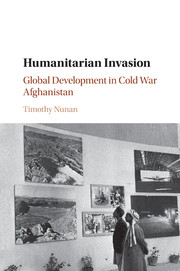Crossref Citations
This Book has been
cited by the following publications. This list is generated based on data provided by Crossref.
Marsden, Magnus
Ibañez-Tirado, Diana
and
Henig, David
2016.
Everyday Diplomacy.
The Cambridge Journal of Anthropology,
Vol. 34,
Issue. 2,
Duschinski, Haley
and
Bhan, Mona
2017.
Introduction: law containing violence: critical ethnographies of occupation and resistance.
The Journal of Legal Pluralism and Unofficial Law,
Vol. 49,
Issue. 3,
p.
253.
Filardo, Peter Meyer
2017.
United States Communist History Bibliography 2016, and a Selective Bibliography of Non-U.S. Communism and Communism-Related Theory.
American Communist History,
Vol. 16,
Issue. 3-4,
p.
168.
Manchanda, Nivi
2017.
Rendering Afghanistan legible: Borders, frontiers and the ‘state’ of Afghanistan.
Politics,
Vol. 37,
Issue. 4,
p.
386.
Leake, Elisabeth
2018.
Afghan internationalism and the question of Afghanistan's political legitimacy.
Afghanistan,
Vol. 1,
Issue. 1,
p.
68.
Attewell, Wesley
2018.
“From factory to field”: USAID and the logistics of foreign aid in Soviet-occupied Afghanistan.
Environment and Planning D: Society and Space,
Vol. 36,
Issue. 4,
p.
719.
Alimia, Sanaa
2019.
Performing the Afghanistan–Pakistan Border Through Refugee ID Cards.
Geopolitics,
Vol. 24,
Issue. 2,
p.
391.
Mark, James
Iacob, Bogdan C.
Rupprecht, Tobias
and
Spaskovska, Ljubica
2019.
1989.
MOSTOWLANSKY, TILL
2019.
Faraway Siblings, So Close: Ephemeral conviviality across the Wakhan divide.
Modern Asian Studies,
Vol. 53,
Issue. 3,
p.
943.
Manchanda, Nivi
2020.
Imagining Afghanistan.
Leake, Elisabeth
2020.
A Companion to U.S. Foreign Relations.
p.
1005.
Casula, Philipp
2020.
Russia in the Changing International System.
p.
205.
Mostowlansky, Till
2020.
Humanitarian affect: Islam, aid and emotional impulse in northern Pakistan.
History and Anthropology,
Vol. 31,
Issue. 2,
p.
236.
LI, DARRYL
2021.
Aid as pan‐Islamic solidarity in Bosnia‐Herzegovina.
American Ethnologist,
Vol. 48,
Issue. 3,
p.
231.
O'Sullivan, Kevin
2021.
The NGO Moment.
2021.
Konkurrenz um Menschenrechte.
p.
362.
Hanifi, Shah Mahmoud
2021.
Local Experiences of Imperial Cultures.
Comparative Studies of South Asia, Africa and the Middle East,
Vol. 41,
Issue. 2,
p.
243.
Aniche, Ernest Toochi
Moyo, Inocent
and
Nshimbi, Christopher Changwe
2021.
Interrogating the nexus between irregular migration and insecurity along ‘ungoverned’ border spaces in West Africa.
African Security Review,
Vol. 30,
Issue. 3,
p.
304.
Murtazashvili, Jennifer Brick
and
Murtazashvili, Ilia
2021.
Land, the State, and War.
Massoumi, Mejgan
2022.
Soundwaves of Dissent: Resistance Through Persianate Cultural Production in Afghanistan.
Iranian Studies,
Vol. 55,
Issue. 3,
p.
697.



